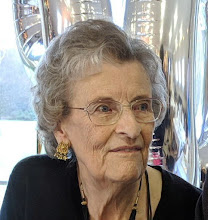 This is a distressing subject. I need to write about it because I am still distressed by what happened. And I think it may be helpful to others in a similar situation. But you don't need to read it, so give it a miss if you'd rather.
This is a distressing subject. I need to write about it because I am still distressed by what happened. And I think it may be helpful to others in a similar situation. But you don't need to read it, so give it a miss if you'd rather. When my husband was in hospital for one of his fairly frequent recent visits, he agreed with his doctor that his notes should carry the letters ‘DNR’, for “do not resuscitate”. We were all relieved that he agreed to the notation, as we knew he was living on borrowed time, and that with his age and present state of health, resuscitation would be likely to leave him in a much worse state than before. Nobody talked to us, however, about what would happen in this connection if he died at home, as he hoped to.
When I got the call from his carer, to say that she thought he had gone, but had called the paramedics anyway, I was over at his house within 15 minutes. I made straight for the stairs so that I could be with him, but the paramedics turned me away, saying "We are doing all we can for him". The significance of those words did not register with me straightaway, and it was some time before I realised that they were trying to resuscitate him.
My pleas to them to stop were useless. The fact that nobody wished him to be resuscitated, including he himself, counted for nothing. Here in the UK, unless there is a letter from a doctor written within the previous two weeks, stating that the patient need not be resuscitated, the paramedics are legally obliged to continue trying, until not only the heartbeat and breathing have stopped, but the last electrical signal from the brain as well. If they have had no success after a certain time, they must take him to hospital where doctors can make the decision. Once I understood this I rang our GP at once; but thankfully, by the time he arrived, after half an hour's strenuous efforts to revive him, my husband had finally 'died' in their terms.
I can understand the reason for such safeguards, but I found it excessively painful at an already painful time. If he had been in hospital they would have let him go, and I could have sat beside him and held his hand. And perhaps while his brain was still bravely sending out its signal, although his heart had stopped, it might also have recognised in some little corner that I was with him. Instead I was barred from his presence, because in the bathroom where he lay there was not room for me as well as the paramedics.
And if it had been me who found him at home, and not his carer, perhaps, knowing his wishes, I could have sent for his GP instead of the paramedics, and we could have been peacefully together at the very last. It is something to think about.
[Edited 06.01.08 - I deleted this post for a while and wrote an alternative version, as I felt it was too personal. Now I have decided to restore it as the truer version. I have left the alternative version too (see 12th February), as the two together have some interest as an exercise in writing about one experience in different ways.]




6 comments:
Judith... as an RN I am passionate about ensuring that any person who is dying, and their family, are treated with the respect, dignity and compassion they deserve. It is a time of life when moments become irreplaceably precious. Reading your story today I had to reach out and express my sadness, and anger, that you were rendered so powerless and stripped of your right to a peaceful farewell. Thank you for sharing this deep distress of yours, I wish that more people were comfortable sharing their thoughts about death and dying.
May your comfort be found in the love you knew together, and continue to know even in his absence. Love is stronger than death... stronger even than a death that was badly 'managed'.
Thanks for your comments, Gracie. I didn't realise I had published that piece, I thought it was still in draft, because I was uncertain whether to go ahead. (Must have hit the wrong button!) But now you have helped me to decide. I too am a firm believer in breaking this particular taboo. I have republished it under today's date though, so that my 'regulars' will see it.
Judith, I share yours and Gracie's views, and do thank you for sharing it with us. Maybe what we should think about is that in spite of appearances everyone acted in what they believed were Michael's best interests, (albeit that the paramedics were "only obeying orders").
There will always be "if only", whatever the circumstances; my guess is that Michael was unaware of what was happening. The pain is for you and his carer.
There are times when what the paramedics did would be exactly the right thing, and they are at a disadvantage not having the prior information that you did. Michael's wish was to die at home; at least that was granted.
Our culture has become too far removed from death and finds it difficult to accept that it is part of life. There may be a turning point one day.
We can but hope.
Pam
Judith, I can't find the amended version anywhere. Clues, please, or a pointer.
So sorry, Keith. I got in a muddle trying to restore it, went away to refresh my brain on something else, then forgot I hadn't sorted it. You will find it now published on 12th February 2007, immediately after the previous one ... I hope!
Curious! I have two different avatars in two comments on this piece. I thought when you changed your picture it changed on every post.
Post a Comment